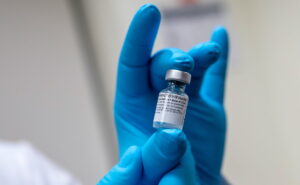by kwheele4 on March 18, 2021
Campus

The Great Vaccination Race: Why PC Students Must Patiently Wait Their Turns
by Katie Belbusti ’22
Opinion Staff
Almost a year after the outbreak of COVID-19 in the United States, the nation continues to work to stop the spread of the disease in a variety of ways—the most promising being the creation and distribution of the COVID-19 vaccine.
While distribution of the vaccine across all states starts with older populations and those most at risk for getting COVID-19, is it fair to place college students in a priority vaccine spot after those vulnerable populations are vaccinated?
In Rhode Island, healthcare workers, first responders, and all persons 65 years and older are currently eligible for the vaccine. However, in other states, communal living constitutes eligibility to receive the vaccine. The very environment of college and dorm-style living makes the spread of illnesses easier, especially the ultra-contagious COVID-19.
While Providence College has focused their efforts more on testing students and faculty as the premier way to determine the spread of the virus and contain it as quickly as possible, perhaps the Continuity Task Force should focus on what obtaining the vaccine would look like for PC.
Dr. Jessica Mulligan, an epidemiology professor at PC for almost 12 years, was willing to speak to The Cowl about the COVID-19 vaccine, including what it would entail for PC to try and vaccinate students. Mulligan is proud and grateful for the arrival of the COVID-19 vaccine, as well as the “potential that vaccines bring for helping us get back to some semblance of normalcy, or a ‘new normal.’”
When asked about vaccine distribution, Mulligan stressed, “It’s important to distribute the vaccines in a way that furthers the goals of health equity, especially because of the specific health disparities around COVID-19 impacting communities differently. COVID-19 has intensified and magnified health disparities, so it’s important that our prevention and treatment programs are based on principles of health equity.”
In short, it is best to focus on vaccinating those who still face a higher risk of getting COVID-19, rather than students. Surrounding communities in Rhode Island should have access to the vaccine before the students at Rhode Island colleges are prioritized.
In an ideal world, PC students would be able to get the vaccine through the College, but the nature of the situation requires us to wait our turn until all adults are eligible for the vaccine, which is now expected to be May 1, according to President Joseph Biden.
As the COVID-19 vaccine distribution continues, and the most high-risk and high-priority individuals receive the vaccine, Mulligan believes that determining who is eligible after that is the question most up for debate. Until more vaccines are distributed to those who are most in need and more vaccines become available, the best any PC student can do is recognize their own impact on stopping the spread of this virus.
As much hope as the COVID-19 vaccines have brought us, until the country reaches a point of herd immunity, it is essential that we continue to follow the protocols recommended by the CDC such as social distancing and mask wearing.
Luckily, PC has remained in close contact with the Rhode Island Department of Health to ensure that being in person at the College can be safe, and it seems to be working. Classes, dining, and now select outdoor sporting events can all be attended in person, and it is because of the Friar family’s commitment to keeping each other safe.